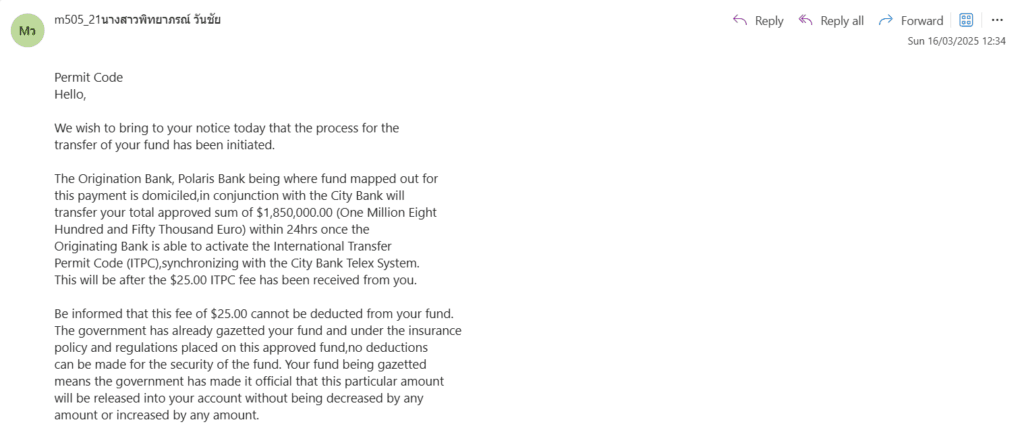Scammers are constantly finding new ways to deceive victims into sending money, and the latest attempt involves a fake email claiming to offer a large financial transfer from Polaris Bank. This scam is designed to trick unsuspecting individuals into paying a bogus fee for an International Transfer Permit Code (ITPC). Here’s everything you need to know about this fraudulent scheme.
Scam Email Details
The scam email is sent from: From: m505_21นางสาวพิทยาภรณ์ วันชัย [email protected]
Sent: 16 March 2025 12:34
Subject: Await
Original Scam Email Content:
Permit Code
Hello,
We wish to bring to your notice today that the process for the transfer of your fund has been initiated.
The Origination Bank, Polaris Bank being where fund mapped out for this payment is domiciled, in conjunction with the City Bank will transfer your total approved sum of $1,850,000.00 (One Million Eight Hundred and Fifty Thousand Euro) within 24hrs once the Originating Bank is able to activate the International Transfer Permit Code (ITPC), synchronizing with the City Bank Telex System. This will be after the $25.00 ITPC fee has been received from you.
Be informed that this fee of $25.00 cannot be deducted from your fund. The government has already gazetted your fund and under the insurance policy and regulations placed on this approved fund, no deductions can be made for the security of the fund. Your fund being gazetted means the government has made it official that this particular amount will be released into your account without being decreased by any amount or increased by any amount.
You are therefore urged to contact us back immediately to enable us finalize the transfer process of your fund with Deutsche Bank. The transfer of your fund will be done electronically, and funds confirmed in your account within specified hours.
I await your quick action on this.
Mr. Victor Brow
Email.. [email protected]

Scam Content Breakdown
In the email, the scammer poses as Mr. Victor Brow claiming to be handling the transfer of $1,850,000.00 on behalf of Polaris Bank and City Bank. They mention the need for an International Transfer Permit Code (ITPC) fee of $25.00 to activate the transaction. The scammer insists this fee cannot be deducted from the fund itself, claiming that the government has “gazetted” the funds to prevent deductions.
The scammer urges urgent action to pressure recipients into paying the fee without further investigation. The email ends by directing victims to contact [email protected] — a clear red flag for a fraudulent scheme.
Red Flags and Warning Signs
This scam displays several common indicators of a phishing attempt:
- Suspicious Email Address: The email originates from an unrelated Thai domain (@lkp.ac.th) instead of an official bank email.
- Unrealistic Financial Promises: The offer of $1.85 million is an absurdly large sum that should raise immediate suspicion.
- Pressure Tactics: Scammers often use urgency, such as claiming the transaction will be processed “within 24 hours” to rush victims.
- Payment Request: Legitimate banks do not request small fees upfront for unlocking large sums of money.
- Poor Grammar and Formatting: The email is riddled with awkward phrasing and inconsistent formatting — signs of a poorly constructed scam.
How to Stay Safe
- Do Not Respond: Avoid replying to the scam email or engaging with the sender.
- Report the Scam: Forward the email to your country’s anti-fraud agency (e.g., Action Fraud in the UK).
- Block the Email Address: Prevent further contact by blocking the scammer’s email.
- Educate Others: Share this warning with friends, family, or online communities to raise awareness.
Conclusion
Scammers continue to refine their tactics, using convincing language and fake financial offers to exploit victims. Always be cautious when receiving unexpected messages that demand payment, especially those promising large financial rewards. Stay vigilant and remember — if it sounds too good to be true, it probably is.
